

USD - California Guides. School of Law Legal Research and Writing Guide - Parentheticals are essentially “mini-rule proofs,” where you provide important information about a case in parentheses after you cite to the case.
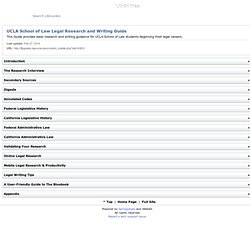
Parentheticals must at minimum provide the facts and holding of a case. Depending on the nature of your written analysis and the precedent case, your parenthetical may also need to briefly address the court’s reasoning. Your parentheticals should contain this information so your reader can understand why the case is relevant to the issue you are addressing. Parentheticals are useful in at least the following four situations. You can use a parenthetical to establish additional authority for a point you have already illustrated with a complete rule proof. In your first year, as well as in the bulk of your practice, you should primarily rely on parentheticals for the first two situations addressed above. Locating the Law, 5th edition, revised (2011) Your Public Law Library. Free Lesson Plans and Games for Learning Civics.
Law Student Guide to Free Legal Research. Zimmerman's Research Guide - American Law Reports (ALR) American Law Reports (ALR) is a multi-series publication comprised of articles that focus on unsettled areas of the law (often a split between federal circuits or state courts).

Each article discusses the issue in detail and provides extensive footnotes to leading judicial opinions. If you find an ALR citation on the issue you are researching, all you have to do is update the key cases -- by running them through Shepard's on Lexis or KeyCite on Westlaw -- and your case law research is pretty much done. You can search for ALR articles on Westlaw (ALR).
Lexis also has all the ALR articles (2NDARY;LEDALR) except for the ALR 1st series. If you have a complete cite, you can pull an article from Westlaw or West Find&Print using the sample format: "xx alr2d xxxx". The print ALR volumes can be found in larger law libraries. Some ALR articles, called "e-annotations," are available only online.
For a more complete discussion of the ALR series, see Fundamentals of Legal Research (West). Zimmerman's Research Guide - Encyclopedias. The leading English-language encyclopedias are the Encyclopaedia Britannica and the Encyclopedia Americana.

The Columbia Encyclopedia (Columbia University Press) is an good 1-volume version. You can get entries from any of these at most public libraries and any related document delivery services, such as . Internet Encyclopedias: Encyclopedia.com hosts several free encyclopedias. Summaries from the Britannica are also available for free. To get full Britannica entries, you can subscribe by the year. MedLine includes the A.D.A.M. medical encyclopedia. Law Library: Research and How-to Guides. ? Lib Guide - Berkeley Law. ? Lib Guides - Chicago Law. HALT - Help Abolish Legal Tyranny. Wex - LII - Dictionary & Legal Encyclopedia. Wisconsin - Electronic Resources. Bankruptcy / Debtor-Creditor Proceedings Coverage to present Guide to resources at the University of Wisconsin Law Library and online.
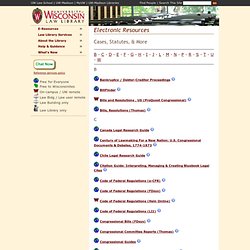
BillFinder Coverage Current calendar year to present (updated daily) Index of state bills for the current calendar year. Includes bill tracking history and some full text bills. WashLaw - List every Agency/State level gov. Electronic Resources by Subject - Emory Law. The following is a list of subscription-based law related electronic resources and databases arranged by subject.
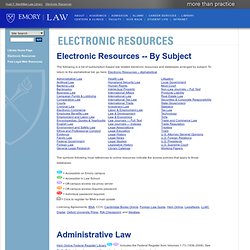
To return to the alphabetical list, go here: Electronic Resources -- Alphabetical The symbols following most references to online resources indicate the access policies that apply to those databases: = Accessible on Emory campus. Justia Blawg - Search Legal Blogs. Basics of Legal Research - Cornell Law. A basic understanding of the United States legal system is essential to knowing what to look for and where to find it.
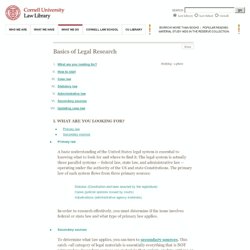
The legal system is actually three parallel systems -- federal law, state law, and administrative law -- operating under the authority of the US and state Constitutions. The primary law of each system flows from three primary sources: Statutes (Constitution and laws enacted by the legislature) Cases (judicial opinions issued by courts) Adjudications (administrative agency materials) Ipl2 - by Subject ("Law") FindLaw.com. LII / Legal Information Institute - Cornell. Nolo.com. Legal Definitions. How To Do Legal Research. Sometimes you need to look up a law to get an answer to your legal question.
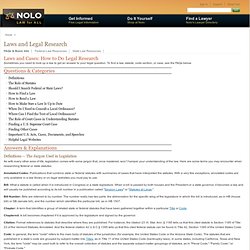
To find a law, statute, code section, or case, see the FAQs below. Definitions -- The Jargon Used in Legislation As with every other area of life, legislation comes with some jargon that, once mastered, won’t hamper your understanding of the law. Here are some terms you may encounter when researching federal or state statutes: Annotated Codes: Publications that combine state or federal statutes with summaries of cases that have interpreted the statutes. Bill: What a statute is called when it is introduced in Congress or a state legislature. Bill Number: Bills are referred to by number. Chapter: A term that identifies a group of related state or federal statutes that have been gathered together within a particular Title or Code. Chaptered: A bill becomes chaptered if it is approved by the legislature and signed by the governor.
Citation: Formal references to statutes that describe where they are published. More U.S.